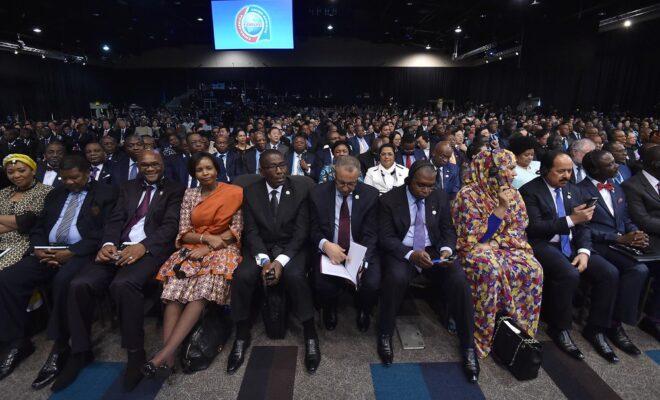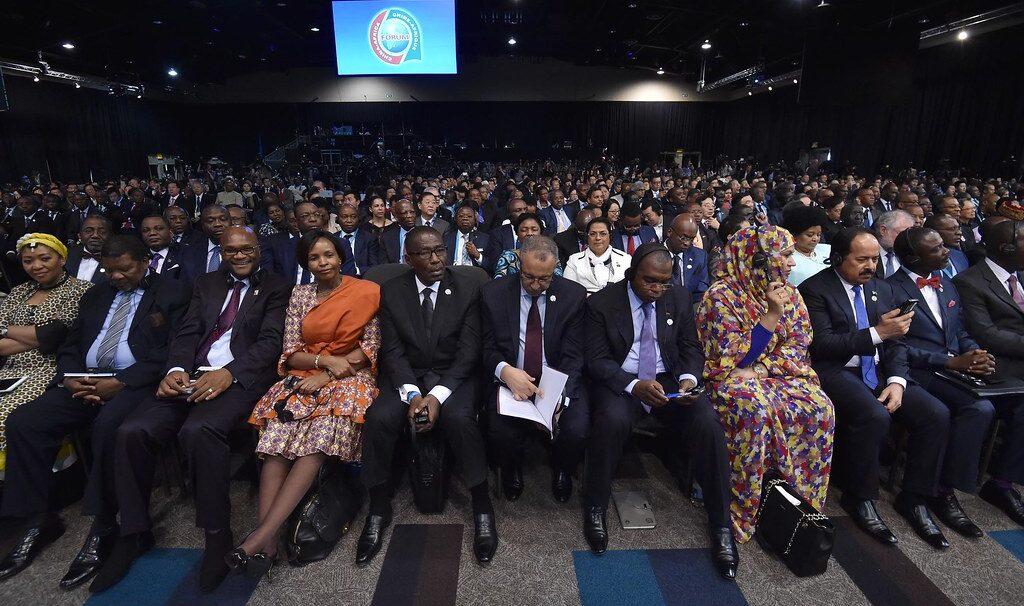Last month could’ve been a real turning point for Africa-China ties

But it wasn’t. Instead of using the maltreatment of Africans in China as an opportunity to take a more assertive stance, Africa’s leaders let it pass.

Africa-China relations are largely driven by high-level state-state relationships through summits such as FOCAC. Credit: GCIS
Read all our COVID-19 coverage
Last month, social media became awash with footage of authorities in China maltreating African residents. In the city of Guangzhou, African migrants were evicted from apartments and denied access to restaurants. A McDonald’s put up a notice saying “black people cannot come in”.
The reaction across Africa was of widespread indignation. #ChinaMustExplain trended as some called on their governments to close Chinese embassies, deport Chinese nationals and recall their ambassadors from Beijing.
African governments scrambled to respond. Ministers made statements on twitter, held meetings, and insisted they would not tolerate such behaviour. Analysts wrote of a “unprecedented rupture” in Africa-China relations.
Just as quickly as it had started, however, the furore subsided. On 12 April, China’s foreign ministry made an announcement in which it did not explicitly apologise but insisted it had “zero tolerance for discrimination” and was “working promptly to improve their working method”. Shortly after, officials across Africa suggested they considered the matter resolved.
Nigeria’s foreign minister, for example, commended the Chinese government for its response to what he described as “unfortunate” incidents. Moussa Faki, Chair of the African Union Commission, explained that China’s foreign minister “reassured me of measures underway in Guangzhou to improve the situation of Africans”.
Crisis moments
By treating the episode as an anomaly caused by local officials, leaders in Beijing and African capitals were able to quickly reset their elite-level relationships. Sino-Africa relations are driven by these connections through which ministers on the continent offer up resources to their Chinese counterparts for desperately needed mega-infrastructure. Other features of partnerships – such as person-to-person exchanges, the pursuit of votes in the UN, and access to new markets – all flow from that central elite bargain.
The agency of African leaders in this dynamic is complex and multi-layered. Some actively take advantage of China’s presence for their own agendas. However, in general, African countries hold a much weaker bargaining position. Experts and activists across the continent have long called for their governments to take a more collective and assertive stance towards their superpower partner.
The “Guangzhou moment” – coming amid a global pandemic – offered a rare opportunity to make this a reality. Whereas the role of leaders is usually to manage day-to-day processes, crises disrupt ordinary patterns. They provide occasions for active leadership to transform societies and relationships. The epoch defining crisis brought about by COVID-19 is creating vast numbers of such moments for potentially meaningful change.
A missed opportunity
The sudden continent-wide outrage at discrimination against Africans in China was one such opportunity. After all, for all its pushback against criticism, the Chinese government is intensely image conscious. It recognises that a significant part of its appeal in Africa rests on it being seen as a more friendly Great Power than yesterday’s imperialists. This is why it puts so much emphasis on “south-south cooperation” and “win-win” scenarios.
With active leadership and collective action, African governments could have called out Beijing’s hypocrisy and demanded a shift in their relationships. Heads of State could have spoken out publicly – in a respectful rather than antagonistic manner – in order to signal to both their own citizens and Beijing that the incident was a top-level priority. African embassies and ministries could have established new communication structures through which their citizens in China could communicate their grievances. This too would have indicated that African governments take seriously how their citizens are treated abroad. With actions like these, African leaders could have started to use local perceptions of China as a more effective tool in their relationships with Beijing.
Instead, the moment was missed and relations were reset – at least for elites. While political leaders may have been forgiven and forgotten, the same is not true for many others in Africa. Following their governments’ inaction, some people’s frustrations spilled over into animosity and violence.
Calls for diplomatic action shifted into more vitriolic anger against Chinese nationals and demands such as #DeportRacistChinese. A few days after Nigeria’s foreign minister suggested the matter was resolved, protesters in Ogun state burned down Chinese-owned shops and factories chanting “enough is enough, we are tired of disrespect”.
Coordinate not kowtow
Relations with China are crucial to many African countries’ economies. They will perhaps become even more so in the aftermath of the COVID-19 pandemic and recession. This might have informed the responses of governments afraid of angering China during ongoing discussions about debt relief.
With more active leadership and foresight, however, African governments might have recognised the opportunity presented by their citizens across the continent – and beyond – momentarily uniting in outrage at the scenes in Guangzhou. They might have realised that now was not the time to kowtow but coordinate as a more united bloc. A moment to re-position the continent with the support of their populations.
Instead, leaders prioritised their elite-level relationships with their Chinese counterparts. This was not only a missed opportunity but has deepened divides between themselves and their own citizens who will have noted how their outspoken anger forced a response from their leaders, but nothing more.






Who will ever get such messages to African leaders? It is extremely frustrating to the point of exhaustion, to continue watching these so-called ‘leaders’ disregard the cries of our people! It is time for a revolution!!